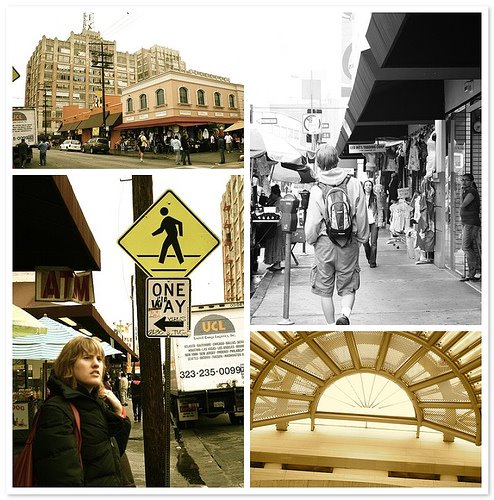This past Sunday my pastor preached about the woman at the well. Obviously I've heard this story a number of times and I have studied it a bit at Fuller. However, I saw it with new eyes this time and as my pastor encouraged us to go home and read the story again and to meditate on it further, I found myself gaining new insights and asking new questions.
One thing that I found to be quite profound is that when the woman recognizes Jesus as a "prophet" her first question is about worship. She is a Samarian and therefore differentiates herself by where she and her people choose to worship. She asks Jesus about the right way/place to worship ... "Sir, I perceive that you are a prophet. Our fathers worshiped on this mountain, but you say that in Jerusalem is the place where people ought to worship". This woman does not know that Jesus is the Messiah but she knows that he has something to offer her. Jesus replies that worship isn't about the place in which one worships or the "right way" within the existing paradigm, but that it's about what God wants and God wants people who will worship Him in spirit and in truth.
I was discussing this with my friend Karla and she said something that was pretty insightful. She said that in essence, the woman at the well was the first theologian. She began God talk or talk about what God wants in the context of her own world. She didn't ask what the temple leaders believed nor did she spout rhetoric on what her people believed. Instead, she was open to asking and receiving of Jesus what the Father desires. Also, how cool that after this conversation the woman says to Jesus, "I know that Messiah is coming (he who is called Christ). When he comes, he will tell us all things". Jesus in turn responds that it is he with whom she speaks that is this Messiah. No wonder she went to town telling everyone who she just met.
I also like the idea of putting myself in her shoes post-Jesus moment. She most likely has a reputation in town of being a bit of a husband hound and may feel a bit ashamed about what people think of her. Despite that, she runs into town telling all of these people that she met a man who knows everything about her past. I mean, hello! She has probably lived her whole adult life trying to put that part of her life in the background. We see this in the way she responds to Jesus when he tells her to bring her husband and she says, " I have no husband". She doesn't say, "well, I have a live-in boyfriend. Would you like me to bring him?" No, she disregards any past with husbands all together. Now, after her time with Jesus she is telling everyone that this man knew her past with all its stickiness.
I think that sometimes I struggle with feeling that "known" by Jesus. I know that he knows all of the flawed parts of me and that he knows what I have done (ugh, that's scary), but I don't know what it would feel like to have him repeat it all back to me. I don't know that I would go running into Monrovia saying, "this man knows all about me. This is my Jesus". Sometimes I feel like I get really stuck in thinking "this man knows all about me. I need to hide. I need to hide. I need to hide". I pray that Jesus would continue to repeat back to me all that my life has been and will in kind connect me to the Father/Mother heart that says, "you are my daughter. I was with you then. I am with you now. You belong to me. Please trust my love for you".
Monday, February 25, 2008
Subscribe to:
Post Comments (Atom)
"What Great Grief Has Made the Empress Mute" June Jordon - Poetess
Because it was raining outside the palace
Because there was no rain in her vicinity
Because people kept asking her questions
Because nobody ever asked her anything
Because marriage robbed her of her mother
Because she lost her daughters to the same tradition
Because her son laughed when she opened her mouth
Because he never delighted in anything she said
Because romance carried the rose inside of a fist
Because she hungered for the fragrance of the rose
Because the jewels of her life did not belong to her
Because the glow of gold and silk disguised her soul
Because nothing she could say could change the melted music of her space
Because the privilege of her misery was something she could not disgrace
Because no one could imagine reasons for her grief
Because her grief required no imagination
Because it was raining outside the palace
Because there was no rain in her vicinity



1 comment:
You are a wonderfully gifted thinker. I am looking forward to reading more of your post. With admiration.
Post a Comment